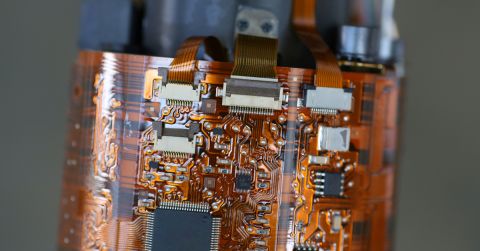How the MIL-STD-1553B Standard Empowers Modern Defense Systems
Mission-critical defense technology requires stringent standards to ensure precision, reliability, and robustness. One such standard is MIL-STD-1553B, which has been revolutionizing the way military aircraft, vehicles, and systems communicate since its inception.
MIL-STD-1533B: An Overview
Originally developed in the early 1970s, the MIL-STD-1553B standard became pivotal with its adoption by the U.S. Department of Defense for the F-16 Fighting Falcon. Since then, it has become a foundational technology in various military hardware platforms across NATO and allied forces.
The MIL-STD-1553B standard is characterized by a robust digital data bus that facilitates high-speed data exchange among multiple subsystems. Given this protocol, data bus couplers are a key hardware enabler of the standard, acting as interface points on the data bus and distributing signals among various subsystems.
The standard itself outlines a dual-redundant, balanced line physical layer, including a bus controller to initiate all communications. Each bus can support up to 31 remote terminals—devices that provide input and output interfaces to the data bus—and can contain one or more bus monitors to passively collect data without affecting the bus operations. These devices are connected to the bus through tributaries called stubs.
Here, the command/response communication method is used to ensure secure and reliable data transfer—even under challenging conditions. This method allows for error checking and retransmission protocols, which are both critical for maintaining data integrity and operational reliability. In conjunction with data bus couplers, several key components within the MIL-STD-1553B standard include:
- Terminators: Positioned at each end of the bus, terminators maintain signal integrity by absorbing signals that reach the bus end, preventing reflection and ensuring stable communication.
- Connectors and Cables: MIL-STD-1553B uses durable, shielded twisted pair cables, and specialized connectors designed to withstand the environmental challenges of military operations, from extreme temperatures to electromagnetic interference.
MIL-STD-1533B in Action
To demonstrate the value of the MIL-STD-1553B, it is important to consider the multifaceted role of the standard in the context of military avionics.
For example, in flight control systems (FCS) this standard allows for the consolidation of cockpit commands with sensor feedback, directly facilitating real-time, automated adjustments to flight parameters. This integration is achieved through MIL-STD-1553B’s high-speed, reliable digital bus, which ensures rapid and error-free data transmission for dynamic flight stability.
Adapters: MIL-STD-1553B adapters are interface devices facilitating communication between avionics systems in aerospace and military applications.

A Quick Look Inside A Military Fighter Jet | Image provided by Cinch Connectivity Solutions
Similarly, in avionic navigation systems, MIL-STD-1553B provides a unified communication framework to seamlessly consolidate data from GPS, radar, and inertial navigation systems. Such integration enables the aircraft to calculate its position, direction, and velocity with accuracy. Furthermore, the standard's robust error-checking mechanisms help to ensure that positioning data is consistently reliable.
In weapon systems, MIL-STD-1553B directly enhances management by interlinking control interfaces and delivery systems. This ability allows for synchronized weapon deployment. In addition, MIL-STD-1553B's diagnostic capabilities support maintenance efforts by providing comprehensive data on system performance and faults, enabling proactive repairs and adjustments. These functions ensure aircraft readiness and extend the operational lifespan of avionic components
PEI Genesis and MIL-STD-1533B
PEI Genesis is helping the aerospace and defense industries deploy MIL-STD-1553B in their designs by supplying MIL-STD-1553B-compliant components.
PEI Genesis’s partnerships with industry leaders, like Cinch Trompeter, allow the delivery of top-tier MIL-STD-1553B-compliant products. For 60 years, Cinch Trompeter has been providing high-reliability solutions for MIL-STD1553B among other applications, and recently, PEI has expanded its offerings in the RF market to deliver these solutions. Current MIL-STD-1553B offering includes products like Trompeter’s data bus connectors, as well as cable assemblies, terminations, RFI caps, adapters, and bus couplers.
In addition, PEI’s focus extends beyond solely supplying parts. We offer comprehensive support to customers, including technical consultations and logistical assistance in each stage of the design lifecycle, from prototype to production. Backed by a team of RF experts, this dedicated support helps clients navigate the complexities of MIL-STD-1553B implementations and empowers the next generation of MIL-STD-1553B applications.
As military and aerospace systems continue to evolve, PEI Genesis remains dedicated to advancing its offerings to meet and exceed the challenges of modern warfare and defense strategies.













